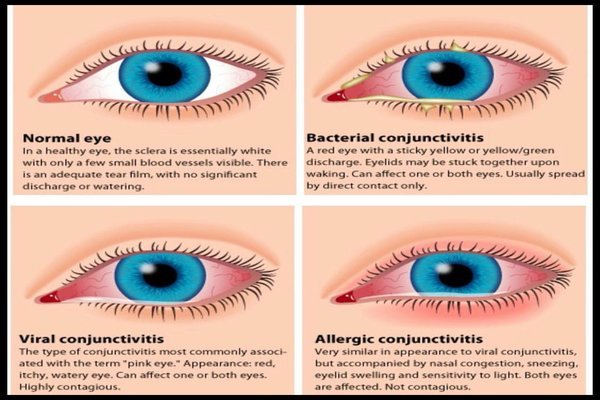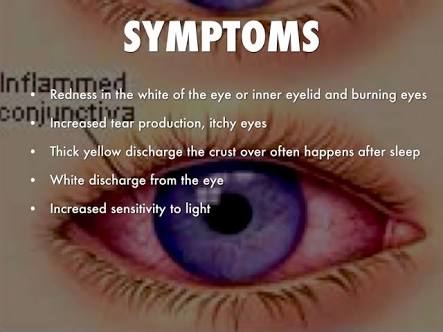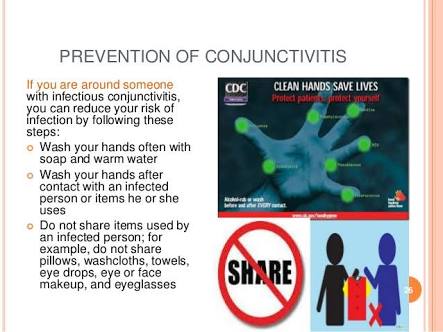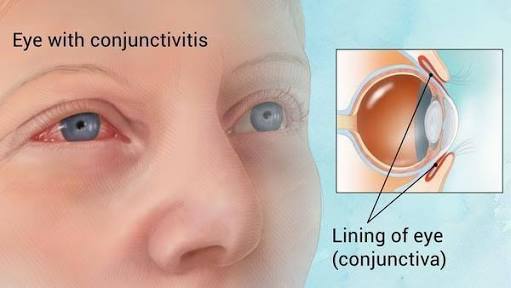CONJUNCTIVITIS
Conjunctivitis is the inflammation of the outermost layer of the sclera and the inner surface of the eyelid. Conjunctivitis is also known as "pink eye"; here in Nigeria it is commonly known as "Apollo", it is highly contagious. Conjunctivitis can be caused by a number of things including allergens, foreign-body irritation, or an infection.
WHAT CAUSES CONJUNCTIVITIS?
A number of things could cause conjunctivitis and they include;
BACTERIA.
The most common types of bacteria that cause bacterial conjunctivitis are Staphylococcus aureus, Haemophilus influenzae, Streptococcus pneumoniae, and Pseudomonas aeruginosa. Bacterial conjunctivitis normally produces a thick eye discharge or pus.VIRUSES.
An Adenovirus is often the cause of viral conjunctivitis. The Herpes Simplex Virus, Varicella Zoster Virus, and the Picornavirus are other examples of viruses that can cause viral conjunctivitis. Symptoms of viral conjunctivitis include redness of the sclera (white part of the eye).ALLERGY.
Allergic conjunctivitis occurs due to an allergy to certain substances, for example, dust or pollen.

Image SourceReaction to eye drops.
FUNGI.
General symptoms associated with fungal conjunctivitis include redness of the eye, itching, discharge from the eye, and irritation.Amoebas and parasites.
Irritants such as shampoos.
A rare but dangerous form of Bacterial conjunctivitis is caused by Gonorrhea( a Sexually Transmitted Disease). This type of conjunctivitis can lead to loss of vision if not treated. Chlamydia can also cause conjunctivitis.
WHAT ARE THE SYMPTOMS OF CONJUNCTIVITIS?
.jpg)
Image Source
For bacterial conjunctivitis, symptoms usually appear 24 to 72 hours after exposure; and in the case of viral conjunctivitis, symptoms begin to appear 5 to 12 days after exposure.
Symptoms of conjunctivitis may vary depending on the cause( whether virus or bacteria or other sources), but they usually include:
• Redness or swelling of the sclera.
• Itchyness, irritation, and/or burning eyes.
• High sensitivity to light.
• Increased amount of tears.
• A sticky coating on the eyelashes may also be seen especially if the conjunctivitis is caused by an allergy.
Both viral and bacterial conjunctivitis can occur coupled with cold or symptoms of respiratory infection such as sore throat.
HOW CAN ONE GET INFECTED WITH CONJUNCTIVITIS?
As earlier stated, conjunctivitis is highly contagious, and as such, the most common modes of exposure are through direct or indirect contact with the liquid that leaks from the eye of an infected person, from contaminated fingers, clothing and eyedroppers.
Conjunctivitis can be easily diagnosed through microscopic examination, clinical examination, bacterial or viral culture.
TREATMENT FOR CONJUNCTIVITIS.
.jpg)
Image Source
• Most often, conjunctivitis resolves on its own but treatment can help to speed up the recovery process. Bacterial conjunctivitis can be treated with antibiotic eyedrops while allergic conjunctivitis can be treated with antihistamines.
• Using an antibiotic to treat viral conjunctivitis is generally ineffective, rather the virus requires time to run its course which is usually 2-3 weeks.
• If the conjunctivitis is caused by an infection, then a warm, moist compress may soothe the eye and help reduce the degree of redness and swelling, but care must be taken when carrying out this procedure because the warm, moist compress can actually spread infection from one eye to the other if one compress is used for both eyes. So to prevent this from happening, a different compress should be used for each eye and a clean compress should be used for each successive application.
• For those that wear contact lenses, it is important and necessary to avoid wearing them whilst affected by conjunctivitis; only go back to wearing them when the conjunctivitis has be treated completely.
PREVENTION/PRECAUTIONS.
.jpg)
Image Source
• The best effective prevention is hygiene; also, rubbing eyes with infected hands should be avoided.
• Eyedrops and ointments, towels, facecloths, and pillowcases should not be shared.
• Vaccination against Adenovirus, Haemophilus influenzae, and Pneumococcus also proves effective.
THANKS FOR READING!!!
.jpg)
Congratulations @von96! You have completed some achievement on Steemit and have been rewarded with new badge(s) :
Click on any badge to view your own Board of Honor on SteemitBoard.
To support your work, I also upvoted your post!
For more information about SteemitBoard, click here
If you no longer want to receive notifications, reply to this comment with the word
STOPThanks.
As i went through your "How can one be infected by conjunctivitis "
I just thought I would see this common notion in our locality that a mere looking at an infected person will get you infected too. Lol. My mom believes in this so much sha but I just guess it's not true because if it was, I would get infected when everyone at home was.
Or just maybe I'm a strong girl😝😝😂
Lol!!! That is just something us Nigerians came up with and unfortunately some persons still believe it up until today.
Congratulations @von96! You received a personal award!
Click here to view your Board
Congratulations @von96! You received a personal award!
You can view your badges on your Steem Board and compare to others on the Steem Ranking
Vote for @Steemitboard as a witness to get one more award and increased upvotes!